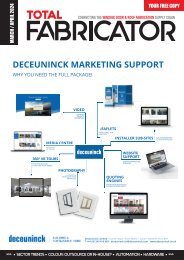Feb/March 2020
You also want an ePaper? Increase the reach of your titles
YUMPU automatically turns print PDFs into web optimized ePapers that Google loves.
Product Training
GAINING THROUGH TRAINING
Tony Powell, business development manager at Senior Architectural Systems, explains how
product suppliers can help strengthen the links in the supply chain by providing fabricators
with quality product training.
Between new product launches,
modifications to existing ranges and
evolving building regulations, not to
mention the need to keep on top of best
practice and health and safety, even the most
experienced of trade fabricators can benefit from
training. However, finding the time to fit training
into a busy work schedule can be equally as
challenging. This is why making product training
accessible and enjoyable should be a key part of
the service that product manufacturers offer their
customers. But what can fabricators expect from
training and more importantly, what can they gain
from it?
The value of training
While training is an essential part of the
construction industry, it is an area that is widely
undervalued and underdeveloped. Not only has
the gradual decline of apprenticeship schemes
made it even harder for young people to develop
the skills they need to be able to pursue a
successful career in the fenestration industry,
but many companies have found that the everincreasing
skills gap
has been a major
barrier to future
growth. On a
personal level,
there’s always
something new
you can learn to do,
or do better. That’s why
training is important at every
stage of your career – not just at the beginning.
Taking advantage of the specific training offered
by manufacturers can help fabricators get the
most out of a product by understanding more
about how it has been developed. Being trained
“Keeping up to date
with new products,
modifications and best
practice is a great way
to raise your game”
to use a specific product not only gives
greater confidence that the chosen
system is fit for purpose and will
meet the various requirements
of the contract, but also ensures
that trade specialists have the
knowledge and skills they need to
be able to ensure correct procedures
are followed on site. This reduces the
likelihood of mistakes being made, which can be
costly and time consuming to put right and which
can cause irreversible damage to reputations.
A hands-on approach
The most effective training is that which
combines practical and theoretical elements –
and the opportunity to put what has been learnt
into practice in a controlled environment. That’s
exactly the format that our own product training
sessions follow, and we have found that even
those who haven’t been in a classroom for years
respond well to the mix of written assessments
and practical tasks.
It’s not just about how the product works though,
the best training also covers the key issues of
health and safety, sustainable construction
techniques and best practice. Having a crosssection
of different ages and levels of experience
taking part in the same training session can
generate some great discussions and can also be
an enjoyable team building exercise.
Tangible benefits
Although training is optional, it is highly
recommended as it can give a great commercial
advantage, and main contractors are increasingly
looking for evidence that the supply chain is
highly skilled and has current competency.
Indeed, we have a number of supplier agreements
28 T F FEB/MAR 2020 CONNECTING THE WINDOW, DOOR & ROOF FABRICATION SUPPLY CHAIN

















